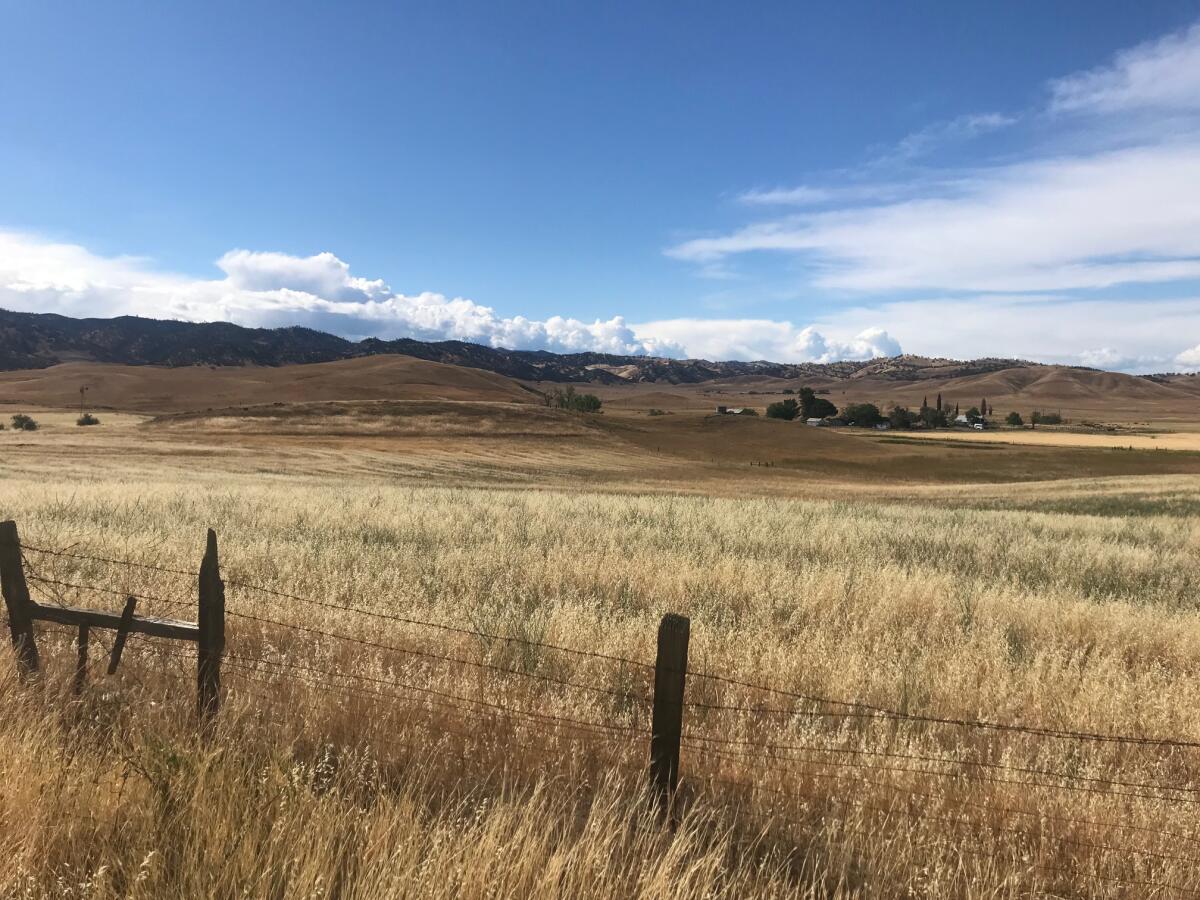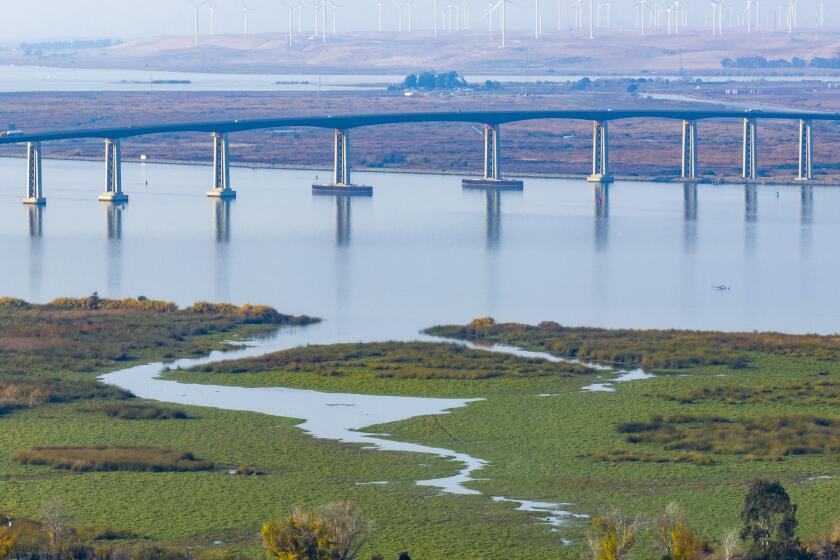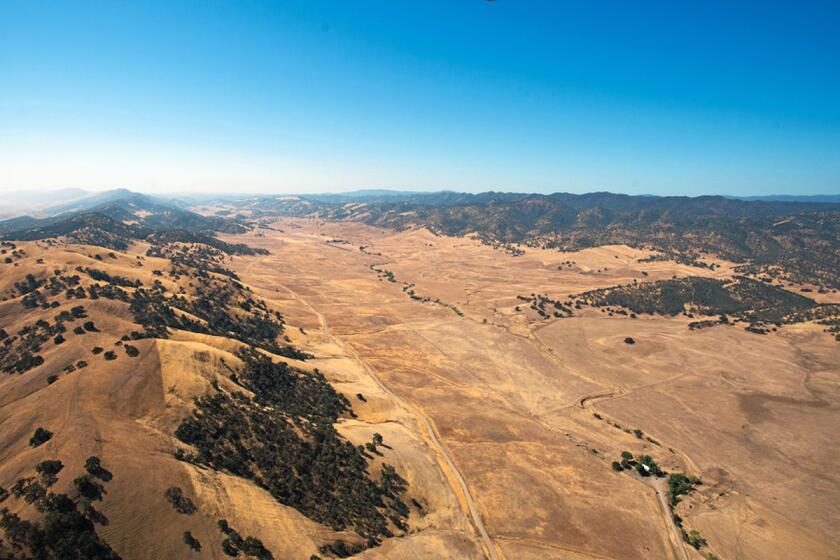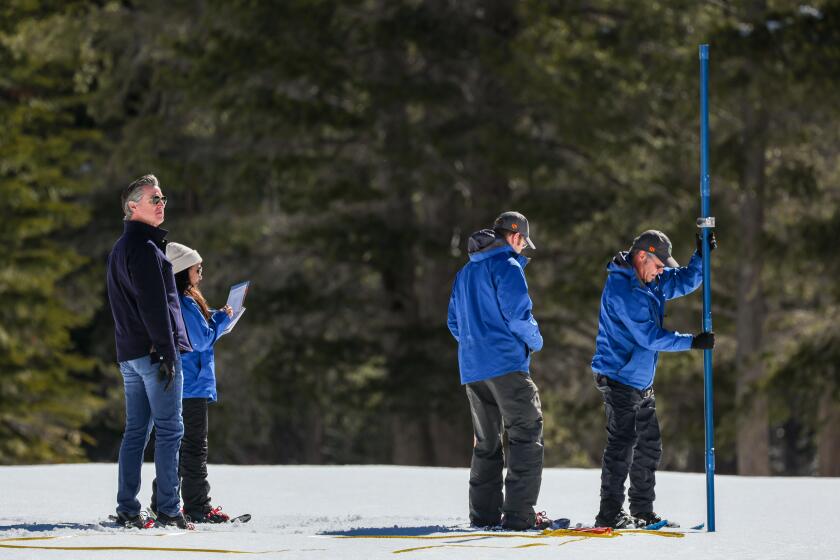Newsom praises court ruling dismissing environmental groups’ challenge of Sites Reservoir

- Share via
California’s plan to build the state’s first new major reservoir in decades is advancing after a court rejected a challenge by environmental groups.
In the ruling last week, a Yolo County Superior Court judge sided against environmental advocates who had argued Sites Reservoir would harm the Sacramento River’s ecosystem and threaten imperiled fish species.
Gov. Gavin Newsom praised the decision, saying the project has cleared a major hurdle.
“California needs more water storage, and we have no time to waste — projects like the Sites Reservoir will capture rain and snow runoff to supply millions of homes with clean drinking water,” Newsom said in a news release Tuesday.
State officials say the reservoir will be able to store enough water to supply the yearly usage of 3 million households.
Experts are urging California officials to beware of pitfalls as they pursue water management agreements in the Sacramento-San Joaquin River Delta.
The reservoir is planned to be built in a valley north of Sacramento to store water for agriculture and cities.
Plans call for two large dams about 300 feet high and nine smaller dams, covering about 14,000 acres and holding water diverted from the Sacramento River.
Environmental advocates with the group Friends of the River have opposed the project, voicing concerns that diverting water would harm struggling fish populations and the ailing ecosystem of the Sacramento-San Joaquin River Delta.
Friends of the River and other groups — including the Center for Biological Diversity, the California Sportfishing Protection Alliance, the California Water Impact Network and Save California Salmon — filed the lawsuit in December.
Patagonia and environmental groups analyzed how much methane would be emitted by California’s planned Sites Reservoir, projecting a large climate impact.
They argued that the Sites Project Authority had violated the California Environmental Quality Act in approving the reservoir.
Judge Samuel T. McAdam ruled against those claims.
Newsom sought to speed the process through an infrastructure streamlining law that was adopted last year. The law, SB 149, requires courts to decide on such environmental challenges within 270 days to the extent feasible.
Newsom’s office noted that last week’s decision occurred in 148 days.
Leaders of the Sites Reservoir Authority praised the ruling, saying that without the actions of the governor and the Legislature, the court case could have taken several years.
“We are grateful the court’s decision will allow us to advance Sites Reservoir and ultimately supply more water for people, farms, and the environment,” said Fritz Durst, chair of the Sites Project Authority board of directors. “The need for this water is significant, and we have no time to waste.”
But Frances Tinney, an attorney with the Center for Biological Diversity, said it is “extremely disappointing that this damaging project is so rushed.”
“An enormous reservoir with enormous consequences should be planned with care,” Tinney said in a news release. “We face a serious extinction crisis and I fear Sites will put an end to the vulnerable fish and wildlife that make the Sacramento River ecosystem one-of-a-kind.”
California Gov. Gavin Newsom has released new a plan outlining state goals for improving water management and adapting to climate change.
Supporters say California needs the reservoir to ensure adequate water supplies as climate change puts growing strains on the state’s limited sources. They also tout its planned off-stream location, which unlike other dams wouldn’t block migrating fish.
The groups that brought the lawsuit, however, called the project a “boondoggle.”
Keiko Mertz, policy director of Friends of the River, said although the court found the project’s environmental impact report was a legally adequate document, “we still believe there were significant flaws, including that [it] doesn’t provide an alternative that protects fish and wildlife.”
Environmental advocates have also raised concerns about greenhouse gas emissions that would be generated by the project.
The cost of building Sites Reservoir is estimated at more than $4 billion.
The Sites Project Authority says it plans to secure the necessary permits to start construction in 2026.










